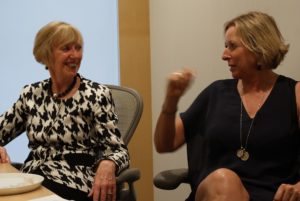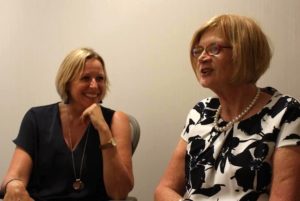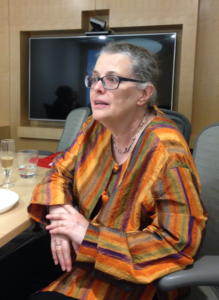This week, our featured member Claudia Lantos tells us about her own leadership development & coaching firm, Lantos Coaching & Consultancy. We asked Claudia about who her clients are and what she can offer them.

Who are your clients?
Our clients are usually organisations operating in a highly competitive market or dealing with continuous change or disruption. We work with both individual executives and teams.
For individuals, we can help them to:
- become more effective
- break with old patterns and habits and improve their personal positioning
- establish more effective management behaviour
- undertake organisational alignment
- transition into a new role
- excel in stakeholder management, and
- enhance their performance and lead better-performing teams.
We also work with teams, both at executive leadership level and the level(s) below and can assist with:
- newly formed teams
- teams experiencing disruptive changes and organisational realignment
- teams which need to become more collaborative and improve their performance and
- teams which need to adjust to a new workplace culture.
Who do you think most benefits from LCC’s services?
Senior executives, emerging leaders and teams alike benefit from partnering with us. We offer best in class program frameworks, methodologies and assessments – all evidence based and with proven effectiveness.
What makes LCC stand out from other coaching businesses?
From briefing to delivery, LCC provides a quick turnaround time. As we are a boutique firm, we can accelerate effectively for our clients.
LCC has four key business principles:
- All our programs are highly customised and tailored to our clients’ specific needs – we don’t believe in a ‘one size fits all approach.’
- Our broad range of specialties, industry knowledge and experience mean we understand our clients, whether they are in the private, public sector or non-government sector.
- We don’t shy away from giving you our best advice, even if this means sometimes needing to ‘tell it like it is’. My Dutch background might be the reason 🙂
- We try to lift our game every time and keep coming up with new approaches and fresh perspectives.
What services does LCC offer?
We offer various kinds of evidence-based coaching including:
- Executive Coaching programs
- Assessments and debriefs
- Leadership Development programs and workshops
- Team Coaching
- High Performance Team programs
- Culture Change programs.
What is your vision and mission for LCC?
LCC’s vision is to encourage and challenge our clients to be the best versions of themselves. This might relate to an individual or a team’s performance and effectiveness, or a changing organisation or culture.
Our mission is to make sure we deliver high quality and highly customised services with direct impact for the client, by sharing our own best practices and let our clients benefit from the combined wealth of experience of our team.
Where does LCC operate?
While we are based in Sydney, we operate throughout Australia. We also offer our executive coaching services via video calling platforms like Skype and FaceTime for executives who are travelling or are based overseas.
How successful are your approaches?
The feedback we get from clients is that we really understand them and their needs. As evidence of this, we have clients coming back to us and referring others to us.
We know you started out in The Netherlands working as a lawyer in labour law. How did you end up working as a coach in Australia?
I’ve called Australia home for the last five years. Prior to that I was working in Europe and South-East Asia. I transitioned from labour law into recruitment and executive search, as part of the national management team of a stock-exchange-listed recruitment group, so I worked both in Amsterdam and Singapore. In that role, I was responsible for opening up new markets and building teams.
Before I moved to Sydney, I had my own coaching business in the Netherlands for 8 years. In my latest venture LCC – Lantos Coaching & Consultancy I try to implement my previous learnings and share best practices with both my clients and my team.
What is it you like about owning your own coaching company?
I really love to empower people. Whether they are my clients, organisations I work with or my own team. Of course you have to love business development, which I do, so I decided to continue my entrepreneurship here in Australia. I find it exciting to inspire my clients to set goals and help them achieve them and becoming more effective. I also set goals for myself and practice what I preach. I’m proud to say that LCC is already going from strength to strength.
Tell us about the team at LCC
Soon after I founded LCC, I asked six high calibre coaches and facilitators with whom I’ve been working together on assignments in the past, to join me. The team, all of whom had also held senior executive roles in the past, bring a complementary range of specialisations, skills and experiences to our coaching practice.
While we often work as individual coaches, for bigger Leadership Development Programs, we team up in pairs or even larger groups – whatever is required to meet the needs of our clients. We pride ourselves on the flexibility of our approaches.
How can people get in touch with you?
You can find me on the Executive Coach Exchange website or you can contact me directly on 0449102060 or by email at lantoscoaching@gmail.com or at www.lantoscoaching.com.

 As you start your search for an executive coach, have you jotted down some ideas about what you are looking for?
As you start your search for an executive coach, have you jotted down some ideas about what you are looking for?



 What is the path to find an executive coach who is right for you? Dorie Clark has some useful tips in this
What is the path to find an executive coach who is right for you? Dorie Clark has some useful tips in this